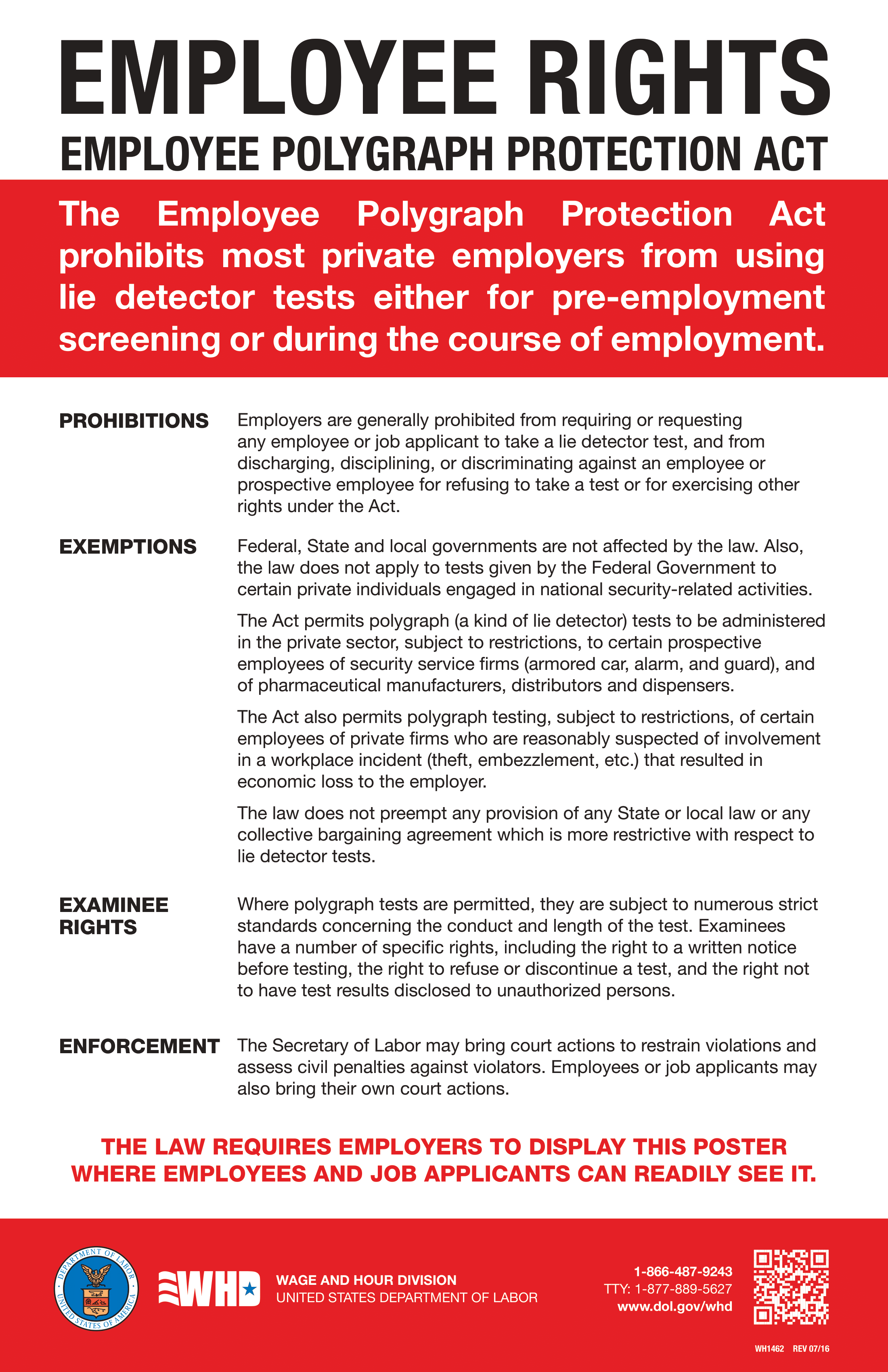|
Employment Integrity Testing
The honesty or integrity of individuals can be tested via pre-employment screening from employers. Employers may administer personnel selection tests within the scope of background checks that are used to assess the likelihood that behavior. Integrity tests are administered to assess whether the honesty of the potential candidate is acceptable in respect to theft and counterproductive work behavior. These tests may weigh in on the final personnel decisions. Integrity testing for employment selection became popular during the 1980s. Human Resources personnel found integrity tests were an improvement over polygraph tests. Polygraph tests were no longer able to be used for screening of most future employees in the United States due to the Employee Polygraph Protection Act of 1988 (EPPA). The two types of tests related to integrity testing are called overt and personality-based measures. The overt test asks about past behavior and attitudes about theft and counterproductive behavio ... [...More Info...] [...Related Items...] OR: [Wikipedia] [Google] [Baidu] |
Honesty
Honesty or truthfulness is a facet of moral character that connotes positive and virtuous attributes such as integrity, truthfulness, straightforwardness, including straightforwardness of conduct, along with the absence of lying, cheating, theft, etc. Honesty also involves being trustworthy, loyal, fair, and sincere. Honesty is valued in many ethnic and religious cultures. "Honesty is the best policy" is a proverb of Edwin Sandys (died 1629), while the quote "Honesty is the first chapter in the book of wisdom" is attributed to Thomas Jefferson, as used in a letter to Nathaniel Macon. April 30 is national Honesty Day in the United States. William Shakespeare famously described honesty as an attribute people leave behind when he wrote that "no legacy is so rich as honesty" in act 3, scene 5 of " All's Well that Ends Well."William ShakespeareAll's Well That Ends WellMIT Shakespeare. Others have noted, however, that "too much honesty might be seen as undisciplined openness". For e ... [...More Info...] [...Related Items...] OR: [Wikipedia] [Google] [Baidu] |
Employee Polygraph Protection Act
The Employee Polygraph Protection Act of 1988 (EPPA) is a United States federal law that generally prevents employers from using polygraph (lie detector) tests, either for pre-employment screening or during the course of employment, with certain exemptions. Under EPPA, most private employers may not require or request any employee or job applicant to take a lie detector test, or discharge, discipline, or discriminate against anybody for refusing to take a test or for exercising other rights under the act. However, the act does permit polygraph tests to be administered to certain applicants for job with security firms (such as armored car, alarm, and guard companies) and of pharmaceutical manufacturers, distributors, and dispensers. The law does not cover federal, state, and local government Local government is a generic term for the lowest tiers of public administration within a particular sovereign state. This particular usage of the word government refers specifically to ... [...More Info...] [...Related Items...] OR: [Wikipedia] [Google] [Baidu] |
Recruitment
Recruitment is the overall process of identifying, sourcing, screening, shortlisting, and interviewing candidates for jobs (either permanent or temporary) within an organization. Recruitment also is the processes involved in choosing individuals for unpaid roles. Managers, human resource generalists and recruitment specialists may be tasked with carrying out recruitment, but in some cases public-sector employment, commercial recruitment agencies, or specialist search consultancies are used to undertake parts of the process. Internet-based technologies which support all aspects of recruitment have become widespread, including the use of artificial intelligence (AI). Process * Job analysis for new jobs or substantially changed jobs. It might be undertaken to document the knowledge, skills, abilities and other characteristics (KSAOs) required or sought for the job. From these, the relevant information is captured in a person specification. [...More Info...] [...Related Items...] OR: [Wikipedia] [Google] [Baidu] |
Impulsivity
In psychology, impulsivity (or impulsiveness) is a tendency to act on a whim, displaying behavior characterized by little or no forethought, reflection, or consideration of the consequences. Impulsive actions are typically "poorly conceived, prematurely expressed, unduly risky, or inappropriate to the situation that often result in undesirable consequences," which imperil long-term goals and strategies for success. Impulsivity can be classified as a multifactorial construct. A functional variety of impulsivity has also been suggested, which involves action without much forethought in appropriate situations that can and does result in desirable consequences. "When such actions have positive outcomes, they tend not to be seen as signs of impulsivity, but as indicators of boldness, quickness, spontaneity, courageousness, or unconventionality" Thus, the construct of impulsivity includes at least two independent components: first, acting without an appropriate amount of deliberation, wh ... [...More Info...] [...Related Items...] OR: [Wikipedia] [Google] [Baidu] |
Big Five Personality Traits
The Big Five personality traits is a suggested taxonomy, or grouping, for personality traits, developed from the 1980s onward in psychological trait theory. Starting in the 1990s, the theory identified five factors by labels, for the US English speaking population, typically referred to as: * openness to experience (inventive/curious vs. consistent/cautious) *conscientiousness (efficient/organized vs. extravagant/careless) * extraversion (outgoing/energetic vs. solitary/reserved) * agreeableness (friendly/compassionate vs. critical/rational) * neuroticism (sensitive/nervous vs. resilient/confident) When factor analysis (a statistical technique) is applied to personality survey data, it reveals semantic associations: some words used to describe aspects of personality are often applied to the same person. For example, someone described as conscientious is more likely to be described as "always prepared" rather than "messy". These associations suggest five broad dimensions used i ... [...More Info...] [...Related Items...] OR: [Wikipedia] [Google] [Baidu] |
Attitude (psychology)
In psychology, attitude is a psychological construct that is a mental and emotional entity that inheres or characterizes a person, their attitude to approach to something, or their personal view on it. Attitude involves their mindset, outlook and feelings. Attitudes are complex and are an acquired state through life experience. Attitude is an individual's predisposed state of mind regarding a value and it is precipitated through a responsive expression towards oneself, a person, place, thing, or event (the attitude object) which in turn influences the individual's thought and action. Most simply understood attitudes in psychology are the feelings individuals have about themselves and the world. Prominent psychologist Gordon Allport described this latent psychological construct as "the most distinctive and indispensable concept in contemporary social psychology."Allport, Gordon. (1935). "Attitudes," in A Handbook of Social Psychology, ed. C. Murchison. Worcester, MA: Clark Univers ... [...More Info...] [...Related Items...] OR: [Wikipedia] [Google] [Baidu] |
Conscientiousness
Conscientiousness is the personality trait of being careful, or diligent. Conscientiousness implies a desire to do a task well, and to take obligations to others seriously. Conscientious people tend to be efficient and organized as opposed to easy-going and disorderly. They exhibit a tendency to show self-discipline, act dutifully, and aim for achievement; they display planned rather than spontaneous behavior; and they are generally dependable. It is manifested in characteristic behaviors such as being neat, and systematic; also including such elements as carefulness, thoroughness, and deliberation (the tendency to think carefully before acting). Conscientiousness is one of the five traits of both the Five Factor Model and the HEXACO model of personality and is an aspect of what has traditionally been referred to as having character. Conscientious individuals are generally hard-working, and reliable. When taken to an extreme, they may also be "workaholics", perfectio ... [...More Info...] [...Related Items...] OR: [Wikipedia] [Google] [Baidu] |
United States
The United States of America (U.S.A. or USA), commonly known as the United States (U.S. or US) or America, is a country primarily located in North America. It consists of 50 states, a federal district, five major unincorporated territories, nine Minor Outlying Islands, and 326 Indian reservations. The United States is also in free association with three Pacific Island sovereign states: the Federated States of Micronesia, the Marshall Islands, and the Republic of Palau. It is the world's third-largest country by both land and total area. It shares land borders with Canada to its north and with Mexico to its south and has maritime borders with the Bahamas, Cuba, Russia, and other nations. With a population of over 333 million, it is the most populous country in the Americas and the third most populous in the world. The national capital of the United States is Washington, D.C. and its most populous city and principal financial center is New York City. Paleo-Americ ... [...More Info...] [...Related Items...] OR: [Wikipedia] [Google] [Baidu] |
Integrity
Integrity is the practice of being honest and showing a consistent and uncompromising adherence to strong moral and ethical principles and values. In ethics, integrity is regarded as the honesty and truthfulness or accuracy of one's actions. Integrity can stand in opposition to hypocrisy, in that judging with the standards of integrity involves regarding internal consistency as a virtue, and suggests that parties holding within themselves apparently conflicting values should account for the discrepancy or alter their beliefs. The word ''integrity'' evolved from the Latin adjective ''integer'', meaning ''whole'' or ''complete''. In this context, integrity is the inner sense of "wholeness" deriving from qualities such as honesty and consistency of character. In ethics In ethics, an individual is said to possess the virtue of integrity if the individual's actions are based upon an internally consistent framework of principles. These principles should uniformly adhere to sound logi ... [...More Info...] [...Related Items...] OR: [Wikipedia] [Google] [Baidu] |
Polygraph Test
A polygraph, often incorrectly referred to as a lie detector test, is a device or procedure that measures and records several physiological indicators such as blood pressure, pulse, respiration, and skin conductivity while a person is asked and answers a series of questions. The belief underpinning the use of the polygraph is that deceptive answers will produce physiological responses that can be differentiated from those associated with non-deceptive answers; however, there are no specific physiological reactions associated with lying, making it difficult to identify factors that separate those who are lying from those who are telling the truth. In some countries, polygraphs are used as an interrogation tool with criminal suspects or candidates for sensitive public or private sector employment. US law enforcement and federal government agencies such as the FBI, DEA, CIA, NSA, and many police departments such as the LAPD and the Virginia State Police use polygraph examinat ... [...More Info...] [...Related Items...] OR: [Wikipedia] [Google] [Baidu] |
Human Resources
Human resources (HR) is the set of people who make up the workforce of an organization, business sector, industry, or economy. A narrower concept is human capital, the knowledge and skills which the individuals command. Similar terms include manpower, Labour (human activity), labor, personnel, associates or simply: people. The Human Resources department (HR department) of an organization performs human resource management, overseeing various aspects of employment, such as compliance with labor law and employment standards, job interview, interviewing and selection, performance management, administration of Employee benefits, organizing of employee files with the required documents for future reference, and some aspects of recruitment (also known as talent acquisition) and employee offboarding. They serve as the link between an organization's management and its employees. The duties include planning, recruitment and selection process, posting job ads, evaluating the performance ... [...More Info...] [...Related Items...] OR: [Wikipedia] [Google] [Baidu] |





